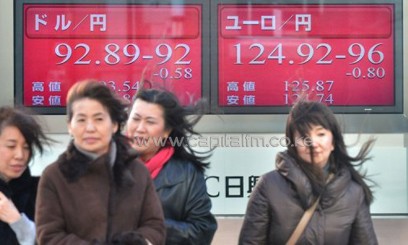
Pedestrians in Tokyo walk past an electronic board displaying the foreign exchange rate/AFP
Tokyo saw a 0.1 percent contraction in October-December from the previous three months, underlining the work ahead for Shinzo Abe’s new government as it tries to boost growth while fending off claims it is manipulating the yen to lift exports.
Financial turmoil in key market Europe, a strong yen and a diplomatic row with China have hurt Japan, frustrating hopes that it would cement a recovery from the 2011 quake-tsunami disaster that battered domestic demand and output.
The country logged modest growth of 1.9 percent for 2012 over the previous year.
Japan has seen a mixed bag of economic data lately as factory output rises while the export picture remains cloudy, with a record trade deficit for 2012.
However, the yen has weakened in recent months, which helps exporters’ competitiveness and provided a much-needed boost to their latest earnings results.
On Thursday the Bank of Japan gave an upbeat assessment of the economy after a two-day policy meeting, saying it appeared to have stopped weakening and adding: “Exports continue to decrease, but the pace of decrease has been moderating”.
It said there were signs of a pick-up in overseas markets. “Japan’s economy is expected to level off more or less for the time being, and thereafter, it will return to a moderate recovery path,” it said.
The bank held off making any new policy announcements after last month’s unveiling of indefinite monetary easing and the adoption of a two percent inflation target. Both moves followed intense pressure from the new government.
The BoJ’s view mirrored those of analysts, who said a better picture abroad and government spending to fuel growth were having an effect.
“While the figures were worse than expected, they aren’t too bad — we could see it rebound in the future,” said Hideki Matsumura, senior economist at Japan Research Institute, referring to the quarterly results.
Key to Japan’s outlook was demand in the United States and an easing in the debt crises in Europe, while some of the nation’s biggest firms have said a slump in shipments stemming from the diplomatic row with China was softening.
Tokyo’s trade deficit with Beijing doubled to a record 3.52 trillion yen ($38 billion) last year, as the feud over a set of islands in the East China Sea spurred a consumer boycott of Japanese goods in China.
Tokyo’s new aggressive economic policy — which has seen the yen tumble about 17 percent since November — has raised eyebrows overseas.
The unit’s steep decline has sparked criticism, particularly from Europe, that the government is engineering a devaluation to boost its exports that risks setting off a global currency war.
But Japan dismisses the charges and markets have cheered Abe’s strong stand, betting his administration may succeed in achieving the strong growth that eluded previous administrations.
The government has approved a $1.02 trillion annual budget that is aimed at pulling the economy out of the doldrums with big spending on public works.
The lower house of parliament on Thursday approved a separate extra budget worth 13.1 trillion yen ($140 billion) to help finance planned government stimulus.
“Housing and public works investments supported the economy,” Naoki Murakami, chief economist at Tokyo brokerage Monex, said in a note.
“The economy will rise from (its) bottom with a recovery in the global economy and a turnaround in monetary policy. Growth in January-March is likely to be above one percent at an annualised rate.”


































